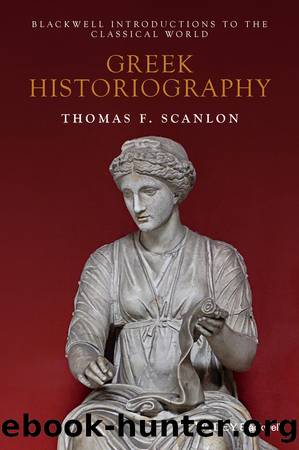Greek Historiography by Scanlon Thomas F.;

Author:Scanlon, Thomas F.; [Scanlon, Thomas F.]
Language: eng
Format: epub
Publisher: John Wiley & Sons, Incorporated
Published: 2015-07-17T00:00:00+00:00
Conclusions
Xenophon’s two major historical works present different paradigms of conflicts and shifting power. While the Anabasis can be seen to focus more directly on issues of leadership and divine providence in a neatly unified narrative, the Hellenica witnesses the fluctuation of hegemony among major Greek states (and Persia) in a veritable multisided chess game, with the dissolution of Athens, the rise, dominance, and decline of Sparta, and the new power of Thebes. Rule is managed in turn by key leaders – Agesilaus, Jason, Epaminondas, and others.
Xenophon’s representation of power reflects the new realities of the ever shifting hegemony in the fourth century, the absence of “superpowers” like those operating during the Persian and Peloponnesian Wars. But the analysis of power is also supplemented by the more focal role of divine intervention. We witness, for example, the powerlessness of those who fail to pick up the dead and dying after the battle of Arginusae, an event attributed to divine fate:
Do not, men of Athens … act like men who are beaten and unfortunate, nor, in the face of heaven’s visitation, show yourselves unreasonable by giving a verdict of treachery instead of helplessness [adunamias], since they found themselves unable on account of the storm to do what they had been ordered to do.
(X. Hell. 1.7.33)
Download
This site does not store any files on its server. We only index and link to content provided by other sites. Please contact the content providers to delete copyright contents if any and email us, we'll remove relevant links or contents immediately.
| Ancient & Classical | Arthurian Romance |
| Beat Generation | Feminist |
| Gothic & Romantic | LGBT |
| Medieval | Modern |
| Modernism | Postmodernism |
| Renaissance | Shakespeare |
| Surrealism | Victorian |
4 3 2 1: A Novel by Paul Auster(11052)
The handmaid's tale by Margaret Atwood(6856)
Giovanni's Room by James Baldwin(5879)
Big Magic: Creative Living Beyond Fear by Elizabeth Gilbert(4723)
Asking the Right Questions: A Guide to Critical Thinking by M. Neil Browne & Stuart M. Keeley(4576)
On Writing A Memoir of the Craft by Stephen King(4214)
Ego Is the Enemy by Ryan Holiday(3991)
Ken Follett - World without end by Ken Follett(3973)
The Body: A Guide for Occupants by Bill Bryson(3802)
Bluets by Maggie Nelson(3711)
Adulting by Kelly Williams Brown(3671)
Guilty Pleasures by Laurell K Hamilton(3587)
Eat That Frog! by Brian Tracy(3514)
White Noise - A Novel by Don DeLillo(3436)
The Poetry of Pablo Neruda by Pablo Neruda(3367)
Alive: The Story of the Andes Survivors by Piers Paul Read(3312)
The Bookshop by Penelope Fitzgerald(3229)
The Book of Joy by Dalai Lama(3218)
Fingerprints of the Gods by Graham Hancock(3214)
